In the vast expanse of the internet, where information is plentiful yet discernment is scarce, how does one navigate the treacherous waters of health advice? Imagine coming across a video claiming to offer miraculous cures for cancer, marketed with enthusiastic testimonials and astonishing before-and-after images. Such an enticing narrative raises a critical question: Can the allure of these faux remedies overshadow the rigorous standards of scientific validation?
As cancer remains one of the leading causes of death globally, the desperation for effective treatment can lead individuals to embrace unproven solutions. The proliferation of fake cancer cures poses a significant public health threat. Social media platforms, particularly YouTube, have become breeding grounds for pseudoscience. Videos garbed in scientific jargon and emotional appeals can easily ensnare those in vulnerable positions. It is imperative to scrutinize these claims with a discerning eye.
At the core of this issue is the tendency for anecdotal evidence to supersede empirical data. Many so-called cures paraded in compelling visual formats often lack rigorous scientific backing. These may include herbal concoctions, restrictive diets, or therapies that promise to detoxify the body in ways that defy biological plausibility. While the desire for holistic and natural treatment methods is understandable, it must be anchored in sound research and clinical validation.
Moreover, the potential physical and financial ramifications of pursuing unverified treatments are dire. Patients may forgo traditional therapies—those that have undergone stringent testing for efficacy and safety—believing in the deceitful narratives spun online. The consequences of this choice can be catastrophic, not only jeopardizing their health but also leading to significant financial burdens. After all, who would want to trade scientifically proven interventions for dubious alternatives?
Education emerges as a formidable ally in combatting the proliferation of false information. Cultivating critical thinking skills and fostering health literacy can empower individuals to question sensational claims. Medical professionals and educators alike should strive to disseminate accurate information, guiding patients toward verified sources of support and treatment. It is also crucial for audiences to engage in open dialogues about health choices and to share knowledge about the importance of vetting information sources.
In a landscape cluttered with misinformation, fostering a culture of skepticism may indeed be our greatest ally. The journey to wellness is not merely about finding the quickest solution but about pursuing methods grounded in truth and integrity. As the search for healing continues, let us challenge the narratives that promise miracles without a foundation of reality. Be informed, be vigilant, and above all, engage with discernment—it’s not just a choice; it’s a necessity.
